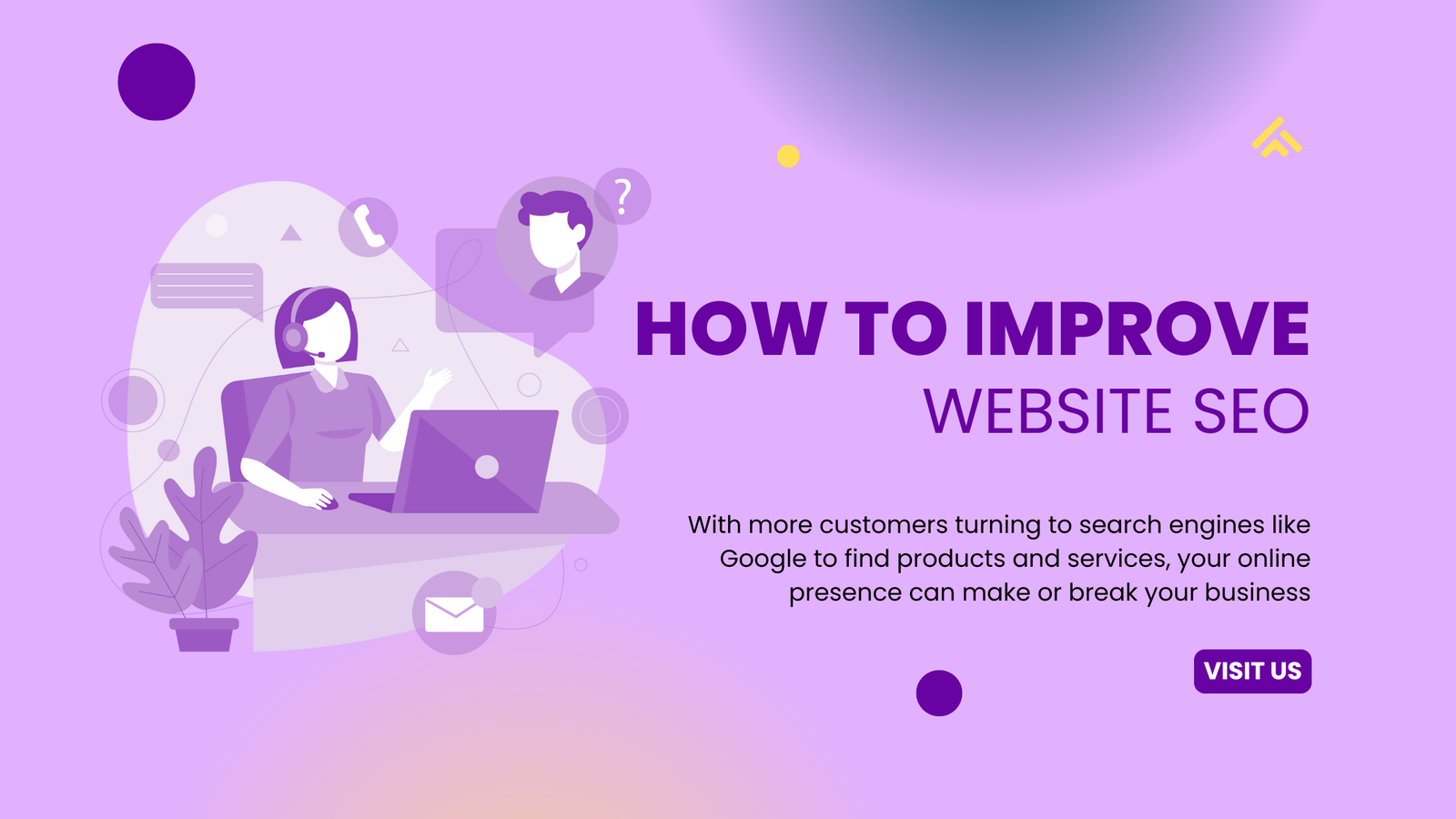In today’s digital age, knowing how to improve website SEO is essential for small business owners. With more customers turning to search engines like Google to find products and services, your online presence can make or break your business. This comprehensive guide will teach you everything you need to know about optimizing your website for search engines and driving organic traffic to your site.
What is Small Business SEO and Why Does it Matter?
Small business SEO refers to the process of optimizing a website to increase its visibility on search engine result pages (SERPs). For small businesses, it can be the difference between thriving and struggling in today’s highly competitive online marketplace.
Search engine optimization matters because it helps you get found by the right audience. By focusing on relevant keywords, building backlinks, and improving technical aspects of your site, you’ll enhance your ranking on Google, which leads to increased traffic and more sales.
In essence, knowing how to improve website SEO allows small businesses to stand out against larger competitors. Through targeted strategies like local SEO, small businesses can rank well for geographically relevant queries, ensuring they’re the top choice for local consumers.
Website SEO Tips for Small Business Owners
To effectively optimize your site, small business owners must implement these website SEO tips:
1. Optimize Website Speed
Search engines, particularly Google, prioritize fast-loading websites. Tools like Google’s PageSpeed Insights can help identify slow-loading pages and offer recommendations to improve your site speed. This step is crucial, as slow websites can result in high bounce rates, negatively impacting your rankings.
2. Ensure Mobile-Friendliness
As more users browse from mobile devices, optimizing your site for mobile is no longer optional. Google’s mobile-first indexing means your site must be responsive, adjusting seamlessly across different screen sizes. Make sure your images, fonts, and menus are optimized for mobile viewing to enhance the user experience and improve your SEO performance.
3. Use Meta Tags and Descriptions Effectively
Meta titles and descriptions are vital in convincing users to click on your link when it appears on SERPs. Your meta tags should include your target keyword and be both concise and enticing. For small businesses, it’s essential to include location-specific keywords in meta tags for better local SEO results.
4. Optimize Internal Linking
Internal linking improves your site’s structure and makes it easier for search engines to crawl and index your pages. Be sure to link relevant pages within your website, guiding users from one section to another, and making it easy for them to find related content.
5. Use Schema Markup for Local SEO
Schema markup is a form of microdata that helps search engines understand your content better. By adding structured data to your website, you increase the chances of appearing in rich results like featured snippets, increasing visibility for local businesses.
How to Improve Website SEO in 2024
As SEO trends evolve, so should your approach. Here’s a step-by-step guide on how to improve website SEO in the coming year.
1. Keyword Research and Targeting
The foundation of SEO starts with effective keyword research. Tools like Ahrefs or Google Keyword Planner can help you find relevant keywords with high search volume and low competition. Focus on long-tail keywords that are specific to your business and location to attract qualified leads.
2. Create High-Quality Content Regularly
Content is king in SEO. Regularly posting valuable and relevant content helps engage your audience while also providing search engines with more pages to crawl. Aim to answer common questions your customers have and optimize these pages with target keywords. Including how to improve website SEO in your content naturally ensures better ranking potential.
3. Optimize Images for SEO
Images are an essential part of user experience, but they can slow down your website if not optimized. Compress images without losing quality and always add alt text with relevant keywords. This not only improves load time but also helps search engines understand the content of the images.
4. Backlink Building
Building high-quality backlinks from reputable sites is one of the most effective ways to boost your SEO. Reach out to industry-specific websites, directories, and influencers to link back to your content. Guest posting and local business partnerships can also help you earn valuable backlinks.
5. Use Google Search Console and Analytics
Monitoring your website’s performance is crucial. Google Search Console can show you which queries are driving traffic, and Google Analytics can provide deeper insights into user behavior. Use these tools to identify what’s working and adjust your strategies accordingly to improve your rankings.
SEO Tips for Startups: Getting Ahead with Minimal Budget
For startups, working with limited resources often means finding cost-effective strategies. Here are some SEO tips for startups that deliver great results without requiring a big budget:
1. Leverage Free SEO Tools
Many tools offer free plans that provide valuable insights. Google Analytics, Ubersuggest, and the free version of Ahrefs are excellent for keyword research, monitoring, and tracking your SEO efforts.
2. Focus on Local SEO
Local SEO helps you compete in specific geographical areas, which is particularly beneficial for new businesses. Ensure your business is listed on Google My Business, and maintain consistency with your business name, address, and phone number across all platforms.
3. Social Media for SEO Boost
Social media presence can indirectly benefit your SEO by driving traffic to your website. Share blog posts, promotions, and updates on social channels to attract your audience and improve user engagement metrics.
4. Content Marketing and Guest Blogging
Guest blogging on reputable sites can drive traffic and help build backlinks. Use this method strategically by contributing high-quality content to websites that are relevant to your industry.
How to Improve Google Rankings for Small Businesses
Improving your Google ranking is critical for increasing traffic and visibility. Here are a few actionable tips to achieve this:
1. On-Page SEO
Optimizing your on-page elements—title tags, meta descriptions, headers, and URL structure—can make a huge difference in your rankings. Make sure your target keywords, such as how to improve website SEO, appear naturally within these areas.
2. User Experience Matters
Google’s algorithm is increasingly favoring sites that provide an excellent user experience. This includes having a responsive website, clean navigation, and fast page speeds. These factors influence metrics like bounce rate and dwell time, which in turn impact SEO.
3. Boost Dwell Time and Reduce Bounce Rates
Engaging content that keeps visitors on your site for longer periods can improve your SEO. Ensure that your content is informative, visually appealing, and easy to read. Reducing bounce rates also means aligning your content with search intent.
4. Regular SEO Audits
SEO is not a one-time task. Perform regular audits to identify issues such as broken links, duplicate content, or missing meta tags. Tools like SEMrush and Screaming Frog can help automate these audits and provide actionable recommendations.
Local SEO for Small Businesses: Dominating Your Area
Local SEO is essential for businesses looking to capture nearby customers. Here’s how to leverage it:
1. Claim Your Google My Business Listing
Your Google My Business profile is your digital storefront. Make sure all information is accurate and regularly updated. Add your business hours, contact details, and even posts to engage your local audience.
2. Optimize for Local Keywords
Incorporate location-based keywords throughout your content. Phrases like “best [industry] service in [city]” can drive local traffic, especially if you’re targeting mobile users looking for nearby solutions.
3. Collect Customer Reviews
Positive reviews not only improve your online reputation but also influence search engine rankings. Encourage satisfied customers to leave reviews on Google, Yelp, and other relevant platforms.
4. Leverage Local Citations
Consistent business citations across local directories, like Yelp or Yellow Pages, help boost your local SEO authority. Be sure your NAP (Name, Address, Phone Number) information is accurate and consistent.
Common Small Business SEO Mistakes to Avoid
Even the best SEO strategies can be undone by a few common mistakes. Avoid these pitfalls:
- Ignoring Mobile Optimization: Ensure your website is mobile-friendly, as the majority of searches are now conducted on mobile devices.
- Keyword Stuffing: Overusing keywords not only hurts readability but can also result in penalties from Google.
- Neglecting Technical SEO: Issues like broken links, 404 errors, or slow site speed can negatively impact your rankings.
- Not Tracking Results: SEO is all about continuous improvement. Without tracking metrics, you won’t know what’s working or where to make adjustments.
Measuring SEO Success for Small Businesses
Success in SEO is measured through a variety of metrics, including:
- Organic Traffic Growth: This is a direct reflection of how well your SEO efforts are paying off.
- Keyword Rankings: Use tools to monitor where your target keywords rank over time.
- Conversion Rate: Higher traffic is great, but how many of those visitors are converting into customers?
- Return on Investment (ROI): Evaluate the cost of your SEO efforts versus the financial gains to ensure a positive ROI.
FAQs Section:
1. What is the best SEO strategy for small businesses?
Focus on local SEO, quality content, and building backlinks.
2. How can I improve my Google rankings for my startup?
Optimize your on-page SEO, build quality backlinks, and improve user experience.
3. What are the most important local SEO factors for small businesses?
Consistent NAP, positive reviews, and local keyword optimization are key factors.
4. How long does it take to see SEO results?
Generally, it takes 3 to 6 months to see significant improvements in rankings.
5. Is SEO worth it for small businesses?
Yes, SEO provides long-term benefits that can significantly increase traffic and revenue for small businesses.
By implementing these strategies, you’ll not only learn how to improve website SEO but also position your small business to thrive in the competitive digital landscape.







Leave a Reply